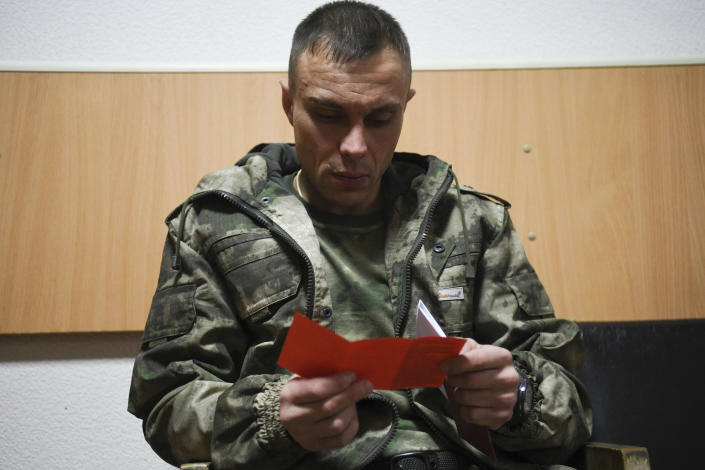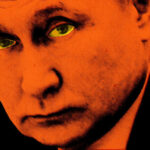A gunman opened fire at a draft office in Russia’s Siberian region of Irkutsk on Monday amid a growing backlash against President Vladimir Putin’s chaotic efforts to mobilize more people to boost his troops in Ukraine.
The man, whom officials have not identified, opened fire in the far-eastern city of Ust-Ilimsk, seriously injuring a recruiting officer, according to the region’s governor, Igor Kobzev. A video circulating online, confirmed by NBC News to have been shot in the draft office, showed people inside running for cover and screaming as the gunman fired.
The shooter has been taken into custody and an investigation has been launched, the Irkutsk division of Russia’s top investigative body said in a release.
While authorities have not commented on the gunman’s possible motive, the incident highlights growing unease among the Russian public after Putin ordered a partial mobilization last week — an unpopular move that Kyiv and its Western allies have said shows his desperation to bolster his faltering military campaign in Ukraine.
It has led many to either flee the country or take to the streets in protest, resulting in more than 2,300 arrests to date, according to OVD-Info, a Russian independent protest monitoring group.
At least a hundred people were arrested in anti-mobilization protests in the North Caucasus region of Dagestan, it said — a rare example of dissent in a staunchly Kremlin-aligned region.


Dozens of women chanted “No to war!” in a protest in the Dagestani capital of Makhachkala on Sunday, according to The Associated Press. Russian media also reported that local police fired warning shots in the air after demonstrators from a local village blocked a major highway. NBC News was not able to independently verify these reports.
In the eastern Siberian town of Yakutsk, local media said hundreds of protesters, mostly women, led a traditional dance in a protest against the mobilization Sunday. OVD-Info reported at least 24 arrests there.
According to Neil Melvin, the director of international security studies at the Royal United Services Institute, a London-based military think tank, the mobilization order has broken Putin’s implicit social contract with the Russian society in which the population ignored the war in Ukraine as long as the conflict did not directly affect them.
The growing outpouring of discontent in dozens of cities since then is a direct response to that, he said.
“I’m very skeptical that this mobilization will improve Russia’s fighting ability,” Melvin added. “These are people who will have very low motivation to fight in the war.”
Reacting to the backlash, Kremlin spokesperson Dmitry Peskov was quoted by Tass state news agency as saying Monday that “mistakes” in how Putin’s order has been implemented, including cases of draft papers being served to those who shouldn’t be mobilized, are being fixed.
Even before the mobilization effort, wartime recruitment drew heavily from the country’s more remote and poorer ethnic regions, such as Dagestan, Chechnya and Buryatia.
Ukrainian President Volodymyr Zelenskyy accused Russia on Sunday of “a calculated imperial policy” in what he said was a deliberate effort to mobilize its indigenous people in regions such as the Caucasus and Siberia.
“We see that people, in particular, in Dagestan, have begun to fight for their lives,” he added. “We see that they are beginning to understand that this is a question of their lives.”
Ukrainian army officials also said Sunday that the Russian command is sending newly mobilized arrivals to the front lines without much training, something that Putin promised wouldn’t happen. NBC News could not independently verify the claim.
But Melvin said it’s further evidence of Russia’s disorganized mobilization drive.
“It starts to look like almost a desperation of throwing bodies into Ukraine, rather than actually training up a fighting force that’s capable of resisting Ukrainian advances,” he said.
Putin’s scramble to call up hundreds of thousands of people is “not a sign of strength,” national security adviser Jake Sullivan said on NBC’s “Meet the Press” on Sunday.
“He knew that as soon as he ordered mobilization, there would be some upheaval in the country, and we are seeing the images and scenes of that right now,” the Biden administration official said.
The unrest throughout Russia comes against the backdrop of a voting process underway in four Moscow-occupied regions of Ukraine. The referendums on whether they should join Russia started last week, and polls are due to run until Tuesday.
Kyiv and its Western partners, including the United States, have decried the votes in the Luhansk, Donetsk, Kherson and Zaporizhzhia provinces as a “sham,” saying Moscow is likely to manipulate the outcome and use it as a pretext to annex Ukraine’s territory.
Meanwhile, the head of the Russian Orthodox Church has said that Russian soldiers who die in the war against Ukraine will be cleansed of their sins.
A Putin supporter, who has backed his invasion of Ukraine, Patriarch Kirill said dying on the battlefield can be seen as an act of “sacrifice.”
“We believe that this sacrifice washes away all the sins that a person has committed,” he said during a Sunday service.
This article was originally published on NBCNews.com




